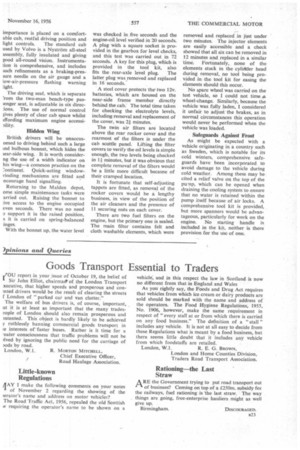Goods Transport Essential to Traders
Page 57

If you've noticed an error in this article please click here to report it so we can fix it.
/OU report in your issue of October 19, the belief of L Sir John Elliot, chairman' of the London Transport xecutive, that higher speeds and prosperous and con!rued drivers would be the result of clearing the streets f London of "parked car and van clutter."
The welfare of bus drivers is, of course, important, ut it is at least as important that the many tradesNople of London should also remain prosperous and interned. This object is hardly likely to be achieved y ruthlessly banning commercial goods transport in le interests of faster buses. Rather is it time for a -eater consciousness that traffic problems will not he >Wed by ignoring the public need for the carriage of vds by road.
London, W.I. R. MORTON MITCHELL, Chief Executive Officer, Road Haulage Association.
Little-known Regulations
1AY I make the following comments on your notes of November 2 regarding the showing of the
■ erator's name and address on motor vehicles? The Road Traffic Act, 1956, repealed the old Scottish od. requiring the operator's name to be shown on a vehicle; and in this respect the law in Scotland is now no different from that in England and Wales As you rightly say, the Foods and Drug Act requires that vehicles from which ice cream or dairy products are sold should be marked with the name and address of the operators. The Food Hygiene Regulations, 1955, No. 1906, however, make the same requirement in respect of "every stall at or from which there is carried on any food business." The definition of a " stall " includes any vehicle. It is not at all easy to decide from these Regulations what is meant by a food business, but there seems little doubt that it includes any vehicle from which foodstuffs are retailed.
London, W.I. R. E. G. BROWN, London and Home Counties Division, Traders Road Transport Association.
Rationing—the Last Straw
ARE the Government trying to put road transport out of business? Coming on top of a £250m. subsidy for the railways, fuel rationing is The last straw. The way things are going, free-enterprise hauliers might as well give up.
Birmingham. DISCOURAGED.




















































































































